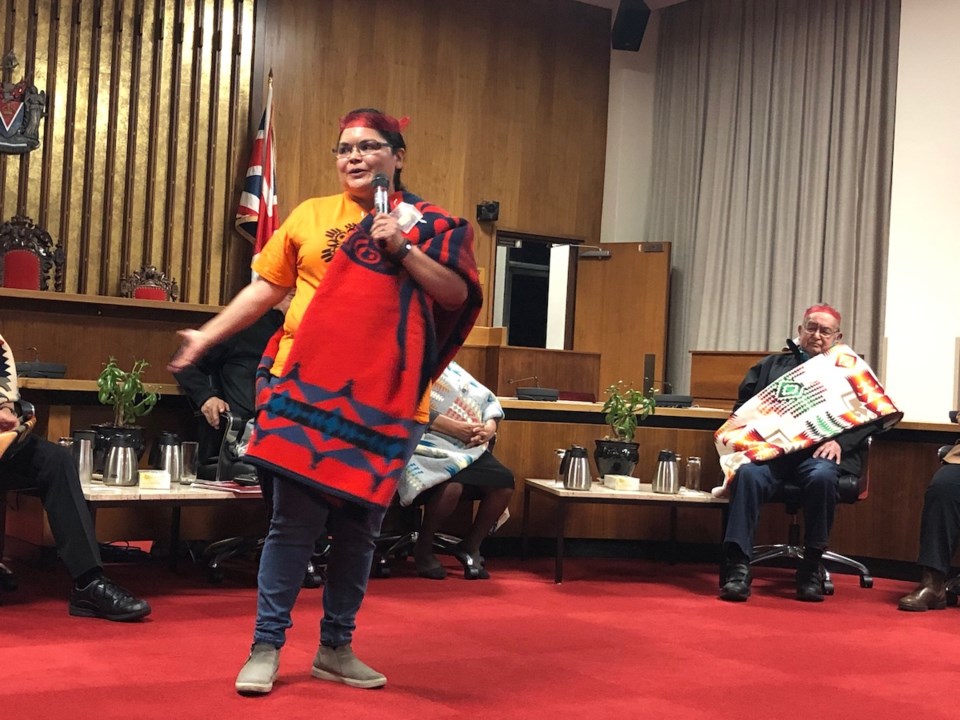The second in a series of six reconciliation dialogues hosted by the City of Victoria has moved venues to accommodate overwhelming interest.
Monday's session focuses on the United Nations Declaration on the Rights of Indigenous Peoples and how the declaration relates to city work and individual lives.
It has been moved from Victoria City Hall council chamber to the Victoria Conference Centre, because more than 280 have already signed up. Mayor Lisa Helps expects there will be still room for those who haven’t registered to join on Monday. The venue has space for 350 people.
The declaration’s 46 articles are meant to ensure human rights and freedoms for Indigenous Peoples, and protect the right to self-determination.
Brianna Bear of Songhees Nation, who is guiding the session, chose the topic, because she thinks it’s important that people understand how Indigenous rights are protected in international law.
“It brings about an understanding that we as Indigenous people know, but a lot of people outside of that don’t know. I think just being able to affirm those rights is super important,” she said.
Bear will begin by providing an overview of the UN declaration and then lead participants through exercises in small groups to deepen their understanding of a few key articles in the declaration.
“It’s more about getting people curious to learn more about the rights themselves to further their own knowledge,” Bear said. “The reconciliation dialogues itself is a journey for people to become curious enough to discover what reconciliation means to them.”
Lekwungen dancers will open the session with a performance, and young Indigenous artists will be selling their work.
The six-part series is designed to bring Indigenous people and non-Indigenous people together to explore how the community can make the culture, history and lived reality of local Indigenous people more visible in the city.
Helps said the sessions build on each other and are designed to be attended as a series.
The first session featured stories told by elders, and focused on Lekwungen history and culture.
“The series began with the elders, because that's the respectful way to begin, with the traditions and the cultures and customs of the land,” said Mayor Lisa Helps. “Now let’s look at what is our responsibility to Indigenous people in international law.”
At the end of the session, Bear and Helps will each present two participants with medallions to act as witnesses to the event and share what they learned. Bear will choose an Indigenous youth and elder and Helps will select a non-Indigenous youth and elder.
Florence Dick of Songhees Nation and Victoria Coun. Marianne Alto, who organized the first session, also selected four witnesses, including Victoria’s deputy police chief Jason Laidman and Emma-Jane Burian, a 17-year-old climate strike organizer.
“For me what felt special, and I think what we’ll see again on Monday, is it was in part presentation and in part ceremony,” Helps said.
In October, the province tabled a bill in the legislature that would implement UNDRIP. If it passes, B.C. will become the first province to legally implement the framework.
Helps said the city is looking at all of the articles in the framework to determine which ones can be implemented at a municipal level.
“It’s a bit of a lens for us to look through in terms of how we do reconciliation and make it meaningful,” Helps said.
All city staff are taking reconciliation training, which includes education on the UN declaration. The training started in 2019 and it will take three years to provide to every staff member, Helps said.
The city’s senior leadership team, including council members, are involved in more intensive training with a focus on building relationships with the Songhees and Esquimalt nations.
The popularity of the public series has exceeded the mayor’s expectations. Helps said about 250 people have already registered for the final four sessions, which stretch into July.
Other dialogues in the series will discuss topics such as the relationship between newcomers to Canada and reconciliation, and the place for controversial historical figures, including Sir John A. Macdonald.
The session starts at 6 p.m. at the conference centre. Doors open at 5:30 p.m. It will also be livestreamed on the city’s website.



